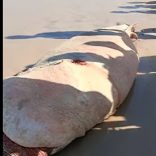Dozens detained in Maputo during lightning police operation - reports
Hidden debts: British judge refuses to strike out Mozambican lawsuit – AIM

File photo: DW
A British High Court judge, Robin Knowles, on Monday refused to dismiss Mozambique’s lawsuit in the case of the scandal of the country’s “hidden debts”.
The defendants, who include the bank Credit Suisse, and the Abu Dhabi based group Privinvest, had attempted to persuade Knowles to throw the case out on the grounds that Mozambique had not provided enough documentation to support its case.
The lawsuit arises from the illicit loans for over two billion US dollars that three fraudulent, security linked Mozambican companies (Proinducus, Ematus and MAM) had obtained from Credit Suisse and the Russian bank VTB in 2013 and 2014.
The loans were only possible because the Mozambican government of the day, under the then President, Armando Guebuza, issued guarantees for 100 per cent of the loans. Finance Minister Manuel Chang signed the loan guarantees even though he knew full well they violated the ceiling on guarantees established under the 2013 and 2014 budget laws.
Predictably, the three companies could not repay the loans and went bankrupt. Thus hidden loans were transformed into hidden debts.
Mozambique took the case to the London courts in an attempt to have the loan guarantees declared null and void, and to secure compensation from Credit Suisse, Privinvest and their corrupt employees. Massive bribery went into securing the loans: Privinvest spent hundreds of millions of dollars on bribing Mozambican officials (including Chang) and Credit Suisse bankers. The three Credit Suisse officials involved in negotiating the loans (Andrew Pearse, Detelina Subeva and Surjan Singh) all admitted to a New York court that they had taken bribes from Privinvest.
In their argument to Judge Knowles, Credit Suisse and Privinvest did not dwell on their own crimes but said the case should be thrown out because of a lack of disclosure by the Mozambican authorities.
However, in Monday’s ruling Knowles determined that the case should continue. He said it was “not just, proportionate or necessary” to strike out the case.
A trial will therefore begin in London on 2 October. Knowles warned, however, that “at trial, all alternatives, including to strike out, in whole or in part” remain available.
“Criticisms of the Republic’s (Mozambique’s) release [of documents], whether individual criticisms or the question of the global effect on confidence in their release, could be highly material on trial. A calibrated response will be possible in a way that is not possible now,” Knowles stressed.
Knowles added he does not now consider there to be a “substantial risk of an unfair trial”, but admits that “he will have to guard with special vigilance against unfairness in the trial”.
The judge warned that the absence of official Mozambican documents could be damaging to the body handling the Mozambican case, the Attorney-General’s Office (PGR).
Knowles warned that during the trial the court “may have to conclude that failures in the Republic’s disclosure or in the Republic’s compliance with its disclosure duties have substantive adverse consequences for the Republic’s case”.
Knowles first raised the possibility of striking out the case in March, when he ordered the Mozambican government to ensure access to relevant documents held in state offices, such as the office of the President and the Intelligence and Security Service, SISE.
It is not surprising that SISE is reluctant to wash its dirty linen in public. For SISE was effectively in charge of the three fraudulent companies, and the SISE head of economic intelligence, Antonio Carlos dos Rosario, became chairperson of the board of all three.
Rosario and his immediate superior, SISE General Director Gregorio Leao, were among those given lengthy prison sentences, at the hidden debts trial that concluded in Maputo in November 2022.
Knowles said British lawyers representing the PGR, together with Assistant Attorney General, Vasco Matusse, met with President Filipe Nyusi, and obtained authorization for additional searches.
After searches in the Office of the President, Offices of the President’s Advisors, the General Secretariat and Office of the Chief of Staff, 20 additional documents were identified.
But searches in SISE were characterised by state secrecy, and Knowles declared “there were no documents or [that] the documents were elsewhere”, with SISE admitting that “it was and continues to be rare for people working at the institution to use institutional email accounts”.
The lawyers for Mozambique urged Knowles to consider that the case concerns “international fraud and corruption of public officials on a massive scale”.
While Credit Suisse has at least admitted that its officials took bribes, Privinvest has made the extraordinary claim that all the payment it made were legal under Mozambican law, a falsehood that the PGR will have no difficulty in tearing to pieces.
Privinvest also claims that it honoured its obligations under its contracts with Proindicus, Ematum and MAM. In fact, an independent audit found that Privinvest had vastly over-invoiced the three companies. It had over- charged them by over 700 million dollars for the fishing boats, radar stations and other assets it supplied.












Leave a Reply
Be the First to Comment!
You must be logged in to post a comment.
You must be logged in to post a comment.